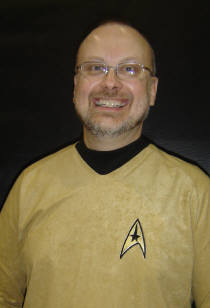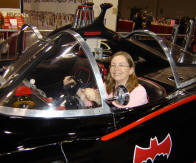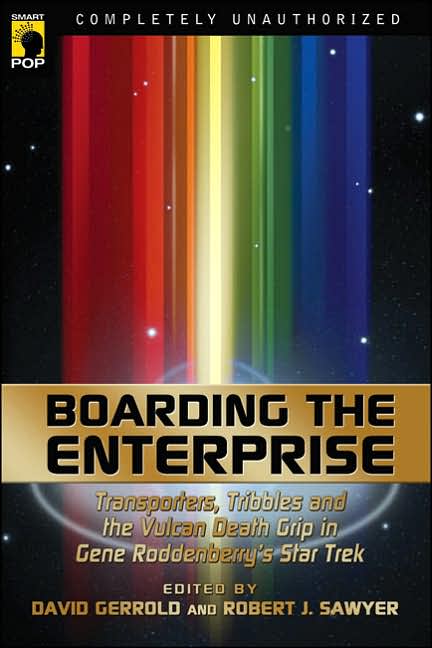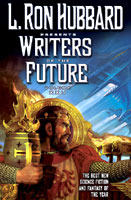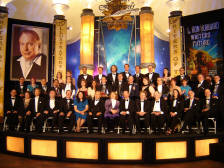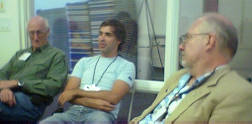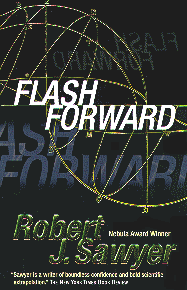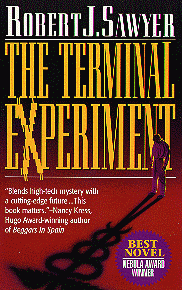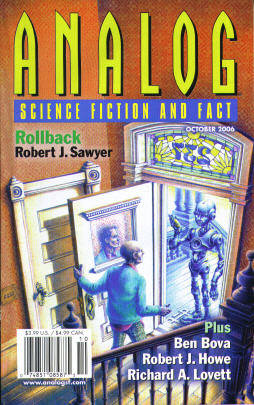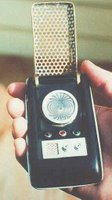Saturday, August 26, was the fourth day of the 2006 World Science Fiction Convention in Los Angeles. Carolyn went off to Disneyland with friend Stella Luuk, but for me the day started with a wonderful two-hour lunch with Eric Greene, who wrote one of my favorite nonfiction books,
Planet of the Apes as American Myth.
Eric is also a policy analyst for the ACLU in L.A., and contributed an essay to
Boarding the Enterprise, the 40th anniversary
Star Trek book that David Gerrold and I edited (and which just came out); Eric also played Lokai in the 1970s Saturday-morning SF show
Space Academy. Eric and I had never met before, but we hit it off fabulously, chatting about
Planet of the Apes and a million other things.
After that, I moderated a panel on dinosaurs; the panel included Worldcon artist Guest of Honor James Gurney and author James P. Hogan, but, truth be told, it suffered from having no actual paleontologist on it. Still, we panelists had a good time, and it seemed like the audience did, too.
I then met for an hour with my agent, Ralph Vicinanza. Lots of good business was discussed.
Next up was a panel on the Renaissance in Hard Science Fiction. Besides myself, the panelist were Gregory Benford, John Barnes, and Alistair Reynolds, plus moderator Allen M. Steele. Like many of the printed panel descriptions in the program book, this one was a bit lame (as moderator, I'd rewritten the proffered one for the dinosaur panel in advance of the con); the description of this one suggested that Vernor Vinge and Greg Egan somehow were new authors, of the same vintage as Charlie Stross: "With the emergence of authors like Stross, MacLeod, Vinge, Egan, etc., Hard SF is making a comeback." I guess the actual panelists were the "etc." :)
Anyway, it was a great panel, with lots of really good discussion and audience participation.
Then it was time for the pre-Hugo-Awards reception. As my guests, I brought Carolyn (of course!), plus Barbara Geiger and Elisabeth Hegerat, who were celebrating their honeymoon at Worldcon (I'd attended their wedding in Calgary on Thursday, August 10), and Kirstin Morrell, the managing editor of Red Deer Press, which is publishing my short-story collection
Identity Theft and Other Stories next year; "Identity Theft" was my Hugo-nominated novella this year.
The reception was very pleasant, but I'd eaten plenty already that day, so didn't have any of the nice spread they'd put out. My guests and I got front-row-center seats for the Hugo ceremony.
Before the ceremony began, I went up to chat with Harlan Ellison -- it ended up being me, Harlan, Tor editor Moshe Feder, and Robert Silverberg, standing and talking in front of the stage for a time. Bob looked at us and said, "Four old Jews." I pointed out that I wasn't Jewish, to which Bob replied, "You are now," and Moshe said, "I snuck into your room last night," and he made a scissors-snipping motion with his fingers. Had I won the Hugo -- which is a very phallic trophy -- I was going to tell Moshe in my acceptance speech to keep his hands off it. :)
Anyway, I was delighted to get to congratulate Harlan in person on his SFWA Grand Master Award -- especially since Harlan has announced that this would be his last convention.
Connie Willis was master of ceremonies for the Hugos, and did her usual terrific job, periodically aided by Bob Silverberg, who was his usual dapper, droll self. The whole ceremony came in at just about exactly two hours and was great fun. That said, I do think it was wrong not to read the names of the writers and directors of the dramatic-presentation nominees; a lot of them were in attendance, and they deserved to have their moment in the sun (indeed, I'd quite enjoyed getting to know Anne Cofell Saunders, who wrote the
Battlestar Galactica episode "Pegasus" -- she and her husband, as it turns out, are great fans of my books, and her husband had in fact been at my very first book signing, back in 1990 for
Golden Fleece).
As I've mentioned before, I lost in the novella category to Connie Willis, but my buddy Robert Charles Wilson won in the novel category for
Spin, and my editor David G. Hartwell won for his editorial work -- a long overdue honor. And John Scalzi gave a terrific, heartfelt speech on winning the Campbell Award for Best New Writer.
After the ceremony, it was off to the Hugo Nominees party, hosted by the crew from Japan who are putting on next year's Worldcon. It was a particularly nice party, and I had a great time.
